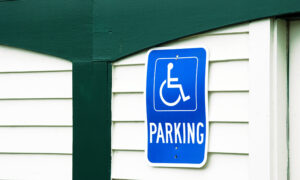There are several federal laws on HOAs that communities must comply with. The board needs to understand these laws to make sure they avoid liability.
What Are the Federal Laws on HOAs?
Homeowners associations are generally limited by what’s stated in the governing documents. However, just because something is not prohibited in the community’s CC&Rs or bylaws doesn’t mean the HOA has free rein. The board must also review any federal laws that might affect how they can govern the community.
What are the federal laws on HOAs that communities should know about? Here is a rundown of all the important applicable federal laws and how to apply them.
1. Americans With Disabilities Act of 1990
 The Americans with Disabilities Act (ADA) protects the rights of persons with disabilities and forbids discrimination against them in areas such as transportation, employment, communications, public accommodations, and access to state and local government services and programs. A disability is defined as any mental or physical impairment that may significantly limit major life activities.
The Americans with Disabilities Act (ADA) protects the rights of persons with disabilities and forbids discrimination against them in areas such as transportation, employment, communications, public accommodations, and access to state and local government services and programs. A disability is defined as any mental or physical impairment that may significantly limit major life activities.
Homeowners associations typically fall under the “public accommodations” category. However, large associations may also need to follow its provisions regarding hiring personnel or operating facilities such as daycares or restaurants. The HOA is covered as an employer if it has 15 or more hired staff.
On the other hand, it’s important to note that “public accommodation” refers only to accommodations and facilities accessible to the general public. Hence, the ADA may not be implicated in private amenities available only to members. However, the facilities must be made according to the published specifications if a community gym or pool is open to the public.
2. Fair Housing Act
The Fair Housing Act (FHA) forbids housing discrimination based on race, sex, color, religion, national origin, familial status, and disability. Homeowners associations cannot take actions that inhibit a person’s right to rent, buy, or enjoy real estate based on said person’s protected class.
One typical example is the attempt to prevent people with children from renting homes in an HOA. Some associations may also prohibit children from using certain common facilities. While the FHA does not explicitly include age, courts have held almost any discrimination related to age as a violation of the FHA.
Homeowners associations should draft regulations that do not explicitly relate to age. For example, pool access may be limited by height but not by age. They should also be careful if any rules or tenant screening policies have disparate impacts on a protected class.
Apart from these, HOAs should be careful about providing reasonable modifications and accommodations to persons with disabilities. The common areas and HOA’s rules must be adjusted to accommodate them. For example, HOAs should be able to make exceptions for assistance or emotional support animals despite pet restrictions.
3. Fair Debt Collection Practices Act
The Fair Debt Collection Practices Act (FDCPA) regulates any debt collector who routinely attempts to collect debts owed to third parties. Debt collectors must provide specific notices to debtors and refrain from harassing or abusing consumers. The act also bans certain forms of communication.
HOAs often collect fees classified as “debts.” The FDCPA only applies if the HOA turns any unpaid fees over to a debt collector or attorney’s office. The FDCPA regulates these firms and must comply with all its provisions.
4. Freedom to Display the American Flag Act
 The Freedom to Display the American Flag Act of 2005 expressly addresses homeowners associations. Under the Act, common interest communities cannot adopt or enforce policies or enter into contracts that prevent or restrict members from displaying the U.S. Flag on residential property.
The Freedom to Display the American Flag Act of 2005 expressly addresses homeowners associations. Under the Act, common interest communities cannot adopt or enforce policies or enter into contracts that prevent or restrict members from displaying the U.S. Flag on residential property.
Homeowners associations have some flexibility as they can regulate the time, place, and means of display. However, the restrictions must be reasonable. The Act also does not protect displays that violate the U.S. Flag Code, so HOAs can prohibit homeowners from displaying the flag vulgar or disrespectfully.
5. Over-the-Air Reception Devices Rule
The Over-the-Air Reception Devices Rule (OTARD) bans restrictions that diminish the use, maintenance, and installation of antennas and reception devices. These devices are often used to receive local broadcasts or wireless cables. The Act protects the following satellite antennas:
- Direct broadcast satellite antennas one meter (or less) in diameter or any size in Alaska
- Antennas made to receive signals for TV broadcast
- Antennas that receive fixed broadband or wireless Internet signals
- Antennas a meter or less (in diagonal measurement or diameter) made to transmit or receive video programming through multipoint distribution services
However, fixed wireless signals exclude FM radio, AM radio, CD radio, HAM radio, and Digital Audio Radio Service (DARS), among other things. Apart from these, OTARD only protects exclusive-use areas such as individual homes. Therefore, members cannot install antennas in HOA common areas.
In addition, HOAs can enforce reasonable restrictions on antennas and satellite dishes as long as they do not impair or substantially increase the cost of use, maintenance, and installation. For example, HOAs can govern where members can place the antennas.
6. United States Bankruptcy Code
The United States Bankruptcy Code is a code that prevents HOAs from taking actions to collect fees subject to the bankruptcy case if a homeowner files for bankruptcy. This includes civil complaints and liens. However, the HOA may resume collections once the court lifts the “automatic stay” or when the case is no longer pending.
If an HOA violates the automatic stay, the bankruptcy court can impose penalties. These may include returning the money or releasing the property lien.
It’s important to note that members may receive a “discharge” from the bankruptcy court. As such, the member is legally absolved of their debt and no longer owes it. If the delinquent assessments are discharged, the member is not obligated to pay those fees.
However, the debts that may be discharged are those included during the bankruptcy case filing. Hence, new assessments that become due will not be subject to the discharge. Additionally, liens may remain even after a discharge. HOAs may enforce the lien after the court lifts the automatic stay.
7. The Servicemembers Civil Relief Act
 The Servicemembers Civil Relief Act (SCRA) protects members of the Marine Corps, Coast Guard, Navy, Air Force, and U.S. Army from foreclosures and collections during service. This includes any servicemember on activated reservists, active duty, and members of the National Guard who are active for more than 30 consecutive days.
The Servicemembers Civil Relief Act (SCRA) protects members of the Marine Corps, Coast Guard, Navy, Air Force, and U.S. Army from foreclosures and collections during service. This includes any servicemember on activated reservists, active duty, and members of the National Guard who are active for more than 30 consecutive days.
However, properties protected from foreclosure are those purchased by servicemembers before active service. If they purchase property during active duty, that property may be subject to foreclosure. In addition, interest on pre-service obligations must be capped at 6% during the service period and for one year after the discharge. HOAs cannot charge more than 6% if they charge interest.
Stay Updated on Federal Laws
Homeowners associations must be aware of the various federal laws on HOAs to remain compliant. Otherwise, they might face not only disputes due to their actions but also lawsuits from homeowners. This can be costly and detrimental to the HOA’s overall financial stability.
Do you need help complying with all the federal laws? A management company like Elite Management Services can help. We provide superior HOA management services to all our clients. Dial (855) 238-8488 or reach out to us online for more details!
RELATED ARTICLES:
- Should HOAs Require Vendor Insurance?
- How To Deal With Hoarders In HOAs
- Which States Have The Most Bugs In America?







